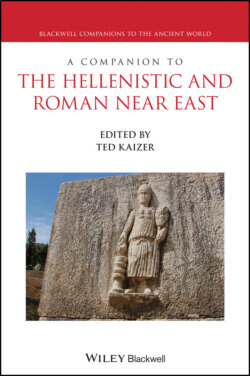Читать книгу A Companion to the Hellenistic and Roman Near East - Группа авторов - Страница 68
Relevance for the History of the Jews
ОглавлениеWhat is the relevance of these works for the history of the Hellenistic and Roman Near East? Obviously, Josephus focuses on the history of the Jews, especially on the Jews in their heartland Judaea. However, as we will see in subsequent sections, he is also a relevant source for some other topics.
The Jewish War concerns the conflict between the Jews and the Romans in Judaea and Galilee in the first century CE. Its overture in books 1 and 2 starts with the invasion and persecution by Antiochus IV (175–164 BCE) in Judaea (1.31–35) and it offers extensive information about the Maccabean revolt and the Hasmonean dynasty of Jewish leaders that resulted from it (1.36–179). Next Josephus focuses on the take-over by the Herodian rulers with Herod the Great (40–4 BCE) as the prime figure (1.180–2.168). This “pre-history” ends with the switch to a direct administration by Roman governors (6–66 CE), which partially coincided with the rule of the Jewish kings Agrippa I (41–44 CE) and II (50–93/4 CE; War 2.169–292). The actual history of the war comprises War 2.293–6.442, starting with provocations by the Roman governor Florus, who relieved the temple treasury of seventeen talents (2.293–308), and culminating with the burning of the temple and the destruction of the city of Jerusalem narrated in book 6. Book 7 deals with the removal of the last hotbeds of resistance, including the rebels on Masada (7.252–406) (Figure 22.3), and the consequences of the Jewish defeat: the triumphal march of the Flavians, described in great detail (7.123–162), the land of the Jews becoming imperial property and the introduction of the fiscus judaicus as replacement of the temple tax, levied on all Jews in the empire (Bilde 1988: 65–70; Heemstra 2010). Josephus’s interpretation of the events is, among other things, apparent from his remark that after Cestius Gallus’s failed attempt to capture Jerusalem and King Agrippa II’s failure to persuade the Jews to desist the eminent Jews left Jerusalem – swimming away from the city “as if from a sinking ship” (2.556) – and from his repeated notices that the radical rebels who stayed behind were fighting each other (e.g. 2.433–448; 4.121–366, 503–584).
Although The Jewish Antiquities cover a far longer period than the War, almost half of its twenty books concern the Hellenistic and early Roman periods (books 12–20). The last book of the section that is based on Jewish Scripture (books 1–11) ends with an excursus on Alexander the Great (336–323 BCE; AJ 11.304–347), a caesura in the composition which explains why Alexander was able to defeat the Persians and found a new empire: when he met the high priest of the Jews in the robes of his office, he realized that the dream he had had meant that the God of the Jews would lead his army to victory (11.329–335). Therefore, Alexander sacrificed to God in the Jerusalem temple and understood that he was the Greek leader who would defeat the Persian Empire as the Book of Daniel that was shown to him implies (Daniel 8:21; AJ 11.336–337). Alexander granted the Jews several privileges, including the right to serve in his army as mercenaries without transgressing their practices (11.338). The excursus shows once again Josephus’s leitmotiv that the God of the Jews determines human affairs and rewards and punishes humans according to their deeds (see above).
Book 12 deals with the period after Alexander’s death (323 BCE) up to the death of Judas (161 BCE), the leader of the Maccabean Revolt against Antiochus IV and V. Books 13 and 14 cover the later Hasmonean rulers as well as the take-over by Herod the Great, who manages to capture Jerusalem only three years after his appointment as king of Judaea by the Roman Senate in 40 BCE. Books 15–17 offer a very detailed report about Herod’s rule and the expansion of his kingdom, based on material from Herod’s aide Nicolaus of Damascus, as well as a less extensive section on Archelaus, Herod’s successor in Judaea (4 BCE–6 CE; AJ 17.200–355). Books 18–20 combine Jewish and Roman history; book 18 covers the period from Archelaus’s deposal to the death of Gaius Caligula. It includes famous passages on John the Baptist (18.116–119) and Jesus Christ, the so-called Testimonium Flavianum (see also 20.200–203 about the execution of Jesus’s brother James; Carleton Paget 2001; Whealey 2003). Book 19 deals with the reign of King Agrippa I (41–44 CE), the scheming that ultimately led to the murder of Gaius Caligula (Wiseman 1991), and the election of Claudius as new emperor. Book 20 concerns the period from the death of Agrippa I to the outbreak of the war against Rome in 66 CE, partly paralleled in War 2 (cf. AJ 20.100–258 with BJ 2.220–284). It includes an elaborate section on the conversion to Judaism of the royal house of Adiabene (20.17–96; further discussion: Bilde 1988: 80–104).
